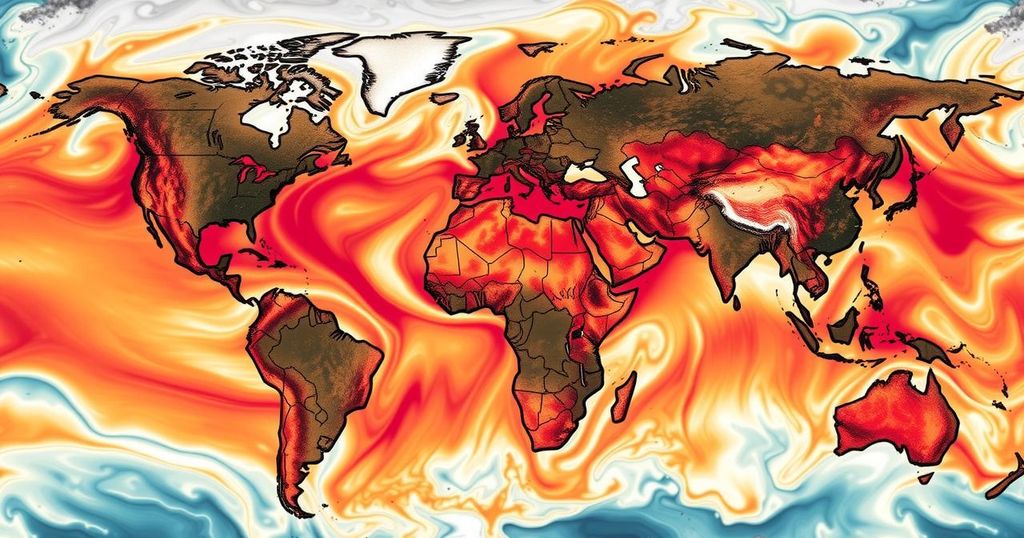In 2024, global temperatures have reached an unprecedented 1.6C above preindustrial levels, marking the first time the 1.5C threshold has been surpassed. This increase is primarily a result of fossil fuel combustion, leading to intensified extreme weather events and impacting millions. Experts warn that immediate global action is required to avert catastrophic climate consequences, as carbon emissions continue to rise and the likelihood of surpassing the Paris Agreement limits increases.
The year 2024 has set a new record for global temperatures, surpassing the critical threshold of 1.5C above preindustrial levels for the first time, according to the EU’s Copernicus Climate Change Service (C3S). The average temperature reached 1.6C higher than preindustrial averages, illustrating an alarming increase of 0.1C over the previous record set in 2023. This unprecedented warming, primarily driven by fossil fuel combustion, has severe implications for extreme weather, impacting millions worldwide.
The Paris Agreement’s target of 1.5C is averaged over longer periods, so a single year’s spike does not indicate a total failure, yet it signifies the ongoing escalation of the climate crisis. Historical records demonstrate that every year in the last decade has ranked among the ten hottest since records began in 1850. Notably, on July 10, 2024, 44% of the Earth experienced strong to extreme heat stress, and July 22 marked the hottest day recorded in history.
Dr. Samantha Burgess, deputy director at C3S, emphasized, “There’s now an extremely high likelihood that we will overshoot the long-term average of 1.5C in the Paris agreement limit.” This warming has been exacerbated by record atmospheric water vapor levels, resulting in unparalleled heatwaves and intense rainfall, which have caused widespread hardship.
Additionally, Dr. Friederike Otto from Imperial College London warned that the extreme weather events of 2024 instance, like floods in Valencia and typhoons in the Philippines, were intensified by climate change. Dr. Otto asserted, “This record needs to be a reality check” as the consequences reflect the reality of life at 1.5C. Furthermore, she noted the necessity of transitioning away from fossil fuels and enhancing societal resilience.
Despite these alarming statistics, carbon emissions in 2024 are projected to have reached a new peak, indicating a lack of progress in moving away from fossil fuels. International efforts at the UN climate conference in Dubai in December 2023 do not show signs of achieving their goals, projecting a grim scenario of 2.7C heating by the century’s end. The upcoming deadlines for nations to present new emissions-cutting pledges in February are critical, however, maintaining temperatures below the 1.5C limit remains increasingly unlikely.
While the first half of 2024 saw increased temperatures influenced by the El Niño phenomenon, scientists express concerns that additional factors contributing to this trend may be at play. Changes in pollution from shipping and reduced low-level cloud cover have been identified as contributors to increased warming; however, comprehensive insights into this extreme heat are still being pursued.
The unprecedented levels of recorded water vapor heighten the likelihood of floods and fierce storms, linking to higher sea temperatures, thus intensifying the impact of climate-induced disasters. The average individual experienced an additional six weeks of dangerously hot days in 2024, significantly worsening the effects of heatwaves.
The article addresses the alarming changes in the global climate, specifically noting how the year 2024 marked a critical milestone where the average global temperature exceeded the 1.5C threshold above preindustrial levels. This situation underscores the urgent need for climate action, particularly in reducing fossil fuel reliance, to prevent further exacerbation of extreme weather events that cause widespread suffering. It summarizes scientific observations and predictions regarding climate trends and the implications of the recorded temperature spikes.
In conclusion, the year 2024 has been historically significant, with global temperatures surpassing the 1.5C target for the first time, emphasizing the urgency of the climate crisis. The increase in extreme weather events and the rising carbon emissions signal an immediate need for effective climate action. Without substantial reductions in fossil fuel use and comprehensive global cooperation, the threat of devastating climate outcomes looms larger than ever, necessitating immediate attention and intervention on a global scale.
Original Source: www.theguardian.com






